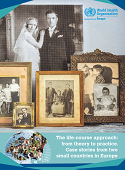The life-course approach: from theory to practice. Case stories from two small countries in Europe (2018)

Download
2018, xiv + 107 pages
ISBN 978 92 890 5326 6
This publication is only available online.
The life-course approach takes a temporal and societal perspective on the health and well-being of individuals and generations, recognizing that all stages of a person’s life are intricately intertwined with each other, with the lives of others born in the same period, and with the lives of past and future generations. Adopting a life-course approach involves taking action early in the life-course, appropriately during life’s transitions, and together as a whole society. The approach is a cornerstone of policy frameworks focused on improving health and health equity, and is recognized as being central to the implementation of Health 2020 and the 2030 Agenda. However, there are recognized challenges in translating the evidence and principles of the approach into policy and practice.
The small countries of the WHO European Region are strongly committed to adopting the life-course approach and to serving as models of best practice and innovation in this area. This publication presents case stories on life-course actions taken by two of the small countries, Iceland and Malta. The stories explore these countries’ translation of life-course principles and evidence into their lifecourse actions, with a focus on addressing health inequities and monitoring and evaluation. The key messages from the case stories discuss the potential enablers and barriers to progression through a cycle required for the advancement of the life-course approach as a policy framework for public health. Finally, the conclusions highlight the importance of strengthening intersectoral partnerships and support for the life-course approach across government and society; ensuring that life-course actions are equity-sensitive and gender-responsive; and prioritizing monitoring, evaluation and knowledge exchange for life-course actions.



